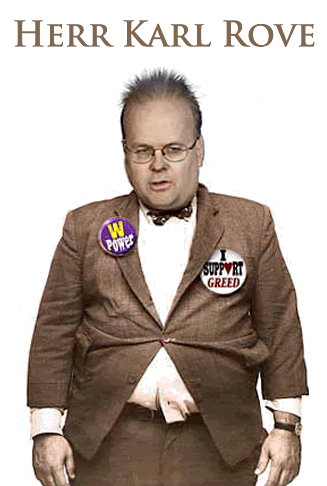Telegraph | News | New claims in CIA row turn heat on Bush aide
Newspapers reported that Karl Rove, the president's chief political strategist, had talked about the agent in a telephone conversation with a columnist in July 2003 shortly before the journalist published the agent's name.
The disclosure of the name, potentially a criminal offence, is the subject of a grand jury investigation that has rocked the White House.
Democrats intensified their calls for Mr Bush to fire Mr Rove, credited with twice putting him in the White House, and often referred to as "Bush's Brain". The president said last year he would fire any staff member who had leaked the agent's identity.
But Republicans hit back, citing a leak from Mr Rove's evidence to a grand jury to argue that far from incriminating him, the details of his conversation with the columnist put him in the clear.

Sources privy to the grand jury told the New York Times and Washington Post that Mr Rove testified last year that in July 2003 he was telephoned by the columnist Robert Novak and asked about the link between a leading critic of the war in Iraq, Joe Wilson, and Valerie Plame, the CIA officer. The pair are married.
Novak said he had heard that Miss Plame suggested that her husband, a former diplomat, be sent on an intelligence mission. Mr Rove told the grand jury that he replied: "I heard that too."
The latest revelation links Mr Rove closer than ever to the outing of Miss Plame. Mr Wilson says she was named to discredit him after he publicly undermined one of Mr Bush's key claims about the threat posed by Saddam Hussein.
But Mr Rove's allies say he has a perfectly respectable defence. His account of discussions with Novak and with another journalist who wrote about the story, indicates that the subject of Miss Plame's role was raised by the journalists, rather than dropped in by Mr Rove.
It seems unlikely that charges will be levelled against Mr Rove. The crime of outing an agent is hard to prove and Miss Plame was not operating under a particularly deep cover, undermining claims that this is a key issue of national security.
Rather the Democrats are raising it as a matter of credibility, highlighting White House statements that Mr Rove was not involved.
Mr Bush yesterday made a point of defending his old friend. For the second consecutive day he walked to a helicopter at the White House with Mr Rove at his side. The image was intended to signal that Mr Bush will not let his man go without a fierce fight.
The next bombshell is expected over the weekend when Matt Cooper of Time magazine, the second journalist Mr Rove spoke to, publishes an account of his grand jury testimony.
Judith Miller, a New York Times reporter who was researching the story, has been jailed for not revealing her sources, until the end of the grand jury investigation, which is likely to be October.
Democratic spokesmen whipped up the row on news channels, employing brutal language against Mr Rove.
Mr Wilson, a former ambassador and a supporter of last year's Democratic presidential nominee, John Kerry, said Mr Rove must be forced out.
After being sent to Niger in 2002 to check British reports that Saddam Hussein was seeking to buy material for a renewed attempt to acquire nuclear weapons, Mr Wilson found the evidence to be extremely questionable and in July 2003 went public.
Critically for Mr Rove, some key Republican Congressmen stand by the White House.
